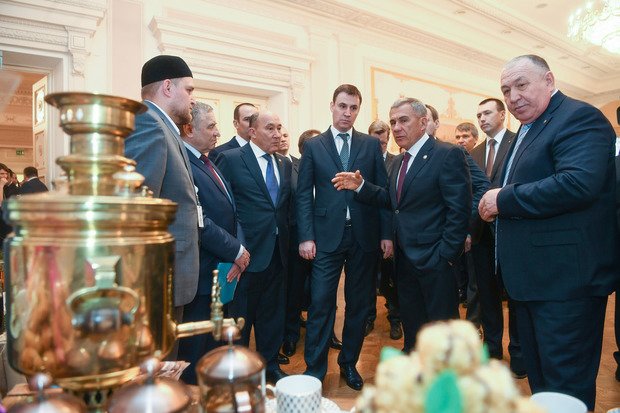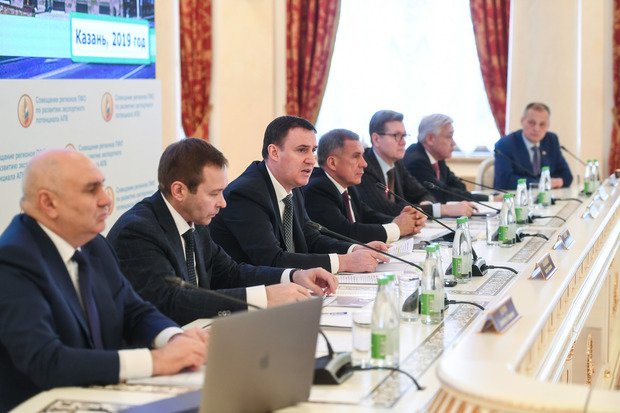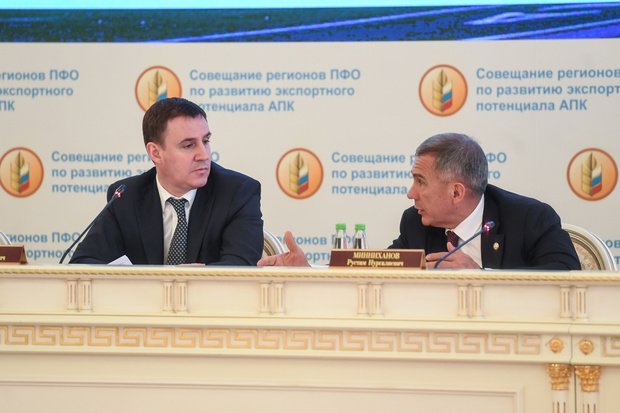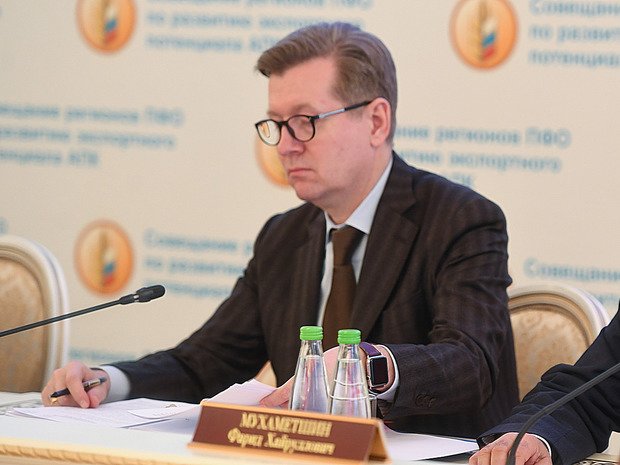Dmitry Patrushev: ''Agricultural exports can't be raised to $45bn without regions''
The Volga regions have been set the task to increase export sales to $2,4 billion, and Tatarstan — to $360 million
On 22 February, Minister of Agriculture and Food of Russia Dmitry Patrushev held an extended meeting in Kazan with the heads of the regions of the Volga Federal District to find state support measures to stimulate the growth of agricultural exports from Russia. He said that by 2024 the volume of exports is to grow to $45 billion against the current $25,8 billion, and immediately identified specific ''orientations'' for each subject of the Volga Federal District. At the same time, he did not conceal that the federal initiative to increase exports faced resistance of certain regions of the district, which do not agree to take on enhanced obligations.
Kazi from Mutigullin and Russkaya Valuta Vodka from Tatspirtprom: what Patrushev was shown
Before the start of the extended meeting on increasing exports, Minister of Agriculture and Food of Russia Dmitry Patrushev, accompanied by Rustam Minnikhanov, visited the exhibition of large Tatarstan exporters. It presented a variety of delicious products of Ak Bars Holding, cheesy collection from Azbuka Syra produced by the Mamadysh cheese plant, sausage cuts of RM brand by IP Motygullin's agricultural production, dairy products of Agrosila JSC and the Kazan dairy plant of the Udmurt KOMOS Group. Despite the fact that milk is a perishable product, the Izhevsk company is planning to export it to China.
Dmitry Patrushev stayed for a longer time near the exhibition of Tatspirtprom, which displayed the most popular export brands, and then carefully studied the blue thermal packages with milk of the Kirov dairy plant (KMK). At the exit, there were bottles with bottled vegetable oil produced by Nefis GC.
Export at $45 billion
Opening the meeting, Dmitry Patrushev said that in the May Decree the president of the Russian Federation outlined the strategic goal for agriculture — to multiply the export of agricultural products to $45 billion. According to him, in 2018 Russian agricultural producers exported food at $25,8 billion. The task to double exports ''is absolutely impossible'', as Dmitry Patrushev put it, without interaction with the subjects of the country. To this end, the ministry of agriculture has opened a series of meetings in all federal districts to define guidelines for each subject.

''We are deciding what part of the export a particular region can provide in the implementation of this strategic task,'' Dmitry Patrushev explained to the heads of the regions.
He reminded that the first such meeting was held in Tula with the governors of the Central Federal District. ''We jointly discussed the forms and volumes of necessary state support. The readiness of the regions to export was demonstrated here,'' he noted with satisfaction.
Dmitry Patrushev lays hope for the fulfillment of this task on the Volga Federal District, which occupies the second place in Russia in production of agricultural products. ''The share of the Volga Federal District in the total volume of planned Russian exports is to grow by more than 6%,'' the minister said.
''According to our forecasts, by 2024 the district will increase exports more than twofold — from the current $1,2 billion to $2,8 billion,'' he outlined the general benchmark, and then divided it by regions.
Thus, Saratov Oblast is to increase the export of agricultural products to $73 million, Nizhny Novgorod Oblast — to $490 million, the Republic of Tatarstan — to $360 million. ''Tatarstan confidently occupies a leading position in Russia for the production of milk,'' Patrushev added. ''We hope that over time, including thanks to the farmers of the republic, milk can become another promising export position of Russia,'' he concluded.
Obstinate regions: everyone has a potential for development
However, not all regions of the Volga Federal District responded positively to the go-team command from the ministry of agriculture. According to Dmitry Patrushev, the department faced a clear misunderstanding.

''However, the ministry with certain bewilderment perceives the attitude of certain subjects to the implementation of the export production volume, designated by the leadership of the country. In particular, we had certain difficulties on agreements with Kirov Oblast and the Republic of Mari El,'' he called those who refused to assume the enchased obligations for export. ''I respect governors of these regions, but I ask to influence in a certain way (obstinate, — author's comment) the heads of agroindustrial complex. We clearly see that there is a potential for development of the agro-industrial complex.''
Minnikhanov: it is necessary to grow 3-4 times
Tatarstan President Rustam Minnikhanov softened the tense tone of the meeting. ''I think that it is necessary to grow not 2 times, but 3-4 times,'' he said optimistically. He presented a detailed picture of modern agriculture. Tatarstan, which occupies 9% of farmland in the Volga Federal District, produces 19% of agricultural products. ''We have built an effective system of representative offices abroad, so we are aimed at unconditional fulfillment of the task of doubling exports,'' he assured.
According to him, the main driver of growth is fat-and-oil products. The leader here is the largest in the Volga region Kazan oil extraction plant with a capacity of seed processing of 1 million tonnes per year. ''By 2024, Nefis plans to increase the volume by 2-2,4 times, which will contribute to the entry into the markets of China and India. There is another leader — Essen company, whose products are exported to 26 CIS countries and the world.''
Today Tatarstan authorities motivate agricultural producers to switch to exports of deep processing products. According to Minnikhanov, 24 projects worth 23 billion rubles are implemented in the republic at the same time, including five projects on complex modernization of dairy plants. New production facilities for processing 1,300 tonnes of milk per day are to be opened, which will increase the existing milk processing capacity by 40% and fully process all raw milk produced in the republic. The issue of pork and chicken processing has been fully resolved, and in 2023 we are to ensure the processing of cattle meat.
The Tatarstan president asked the leadership of the ministry of agriculture to provide state support to remote regions in terms of transportation of grain, these expenditures are 15% of the cost. At the same time, he emphasized the need for preferential loans for the construction and modernization of processing complexes.

''By 2022, we plan to build a complex for deep processing of grain with a capacity of 500,000 tonnes. This is the project of Agrosila JSC. TAIF is planning to produce bioplastics from by-products, production of sugar with a capacity of up to 10,000 tonnes, its cost will be 8,3 billion rubles. Given their scale, we ask to consider the inclusion of these projects in the programme of concessional lending,'' said Rustam Minnikhanov and immediately received approval from federal officials. They assured that within two weeks a new resolution will be issued, which will expand the list of recipients of subsidies for this purpose.
Halal as a driver of exports
Rustam Minnikhanov pointed out the export of halal products as priority areas. The Muslim market is estimated at 11% of the world market. Dubai centre from the UAE trains specialists for the republic for promotion. The Tatarstan president also stressed that for certification of products ''in Russia we must comply with all the parameters''. On April 22, Halal-Expo exhibition is held in Kazan within KazanSummit 2019. Minnikhanov proposed to make it federal for the promotion of products not only from Tatarstan, but also from other regions. ''We need to give a signal to other regions,'' he suggested.
In response, Dmitry Patrushev admitted that halal can provide export growth, but at the same time Russia should develop common principles and approaches for accreditation of manufacturers.
''We have this unit (of Halal products, permissible by Shariah — editor's note) now it is allocated in separate group of study, the separate direction because halal production is the fastest growing segment of consumption of the food around the world, and it is our priority target market. So we are making a special programme on halal products and together with the Russian export centre and the Federal accreditation service we are developing the system,'' said Deputy Minister of Agriculture of the Russian Federation Sergey Levin at the meeting about the planned volumes of production and export of agricultural products of the Volga Federal District in Kazan last Friday.

According to him, the first steps have already been taken — by agreement with the Dubai accreditation centre, together with the centre under the Mufti Council, accreditation of enterprises is underway. However, he said that recently there have been many, several dozen, different accreditation centres, and noted that it is necessary ''to ensure a general procedure and the principle of accreditation''.
''In my opinion, the topic of halal products and international certification of halal products has a very serious, good reason for existence. (… ) We clearly understand that this is a point of growth, and we need to work out this topic as comprehensively as possible,'' Patrushev agreed.